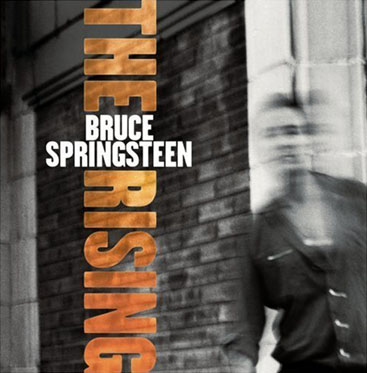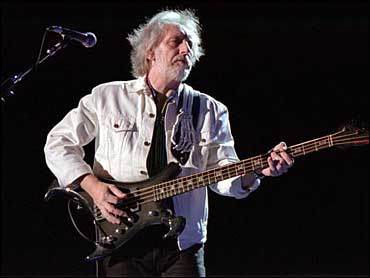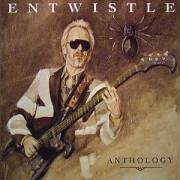![]()
| Ghost World |
|
![]()
Amid post-Sept. 11 loss and mourning, a newly focused
Bruce Springsteen is 'Rising' to the occasion.
by David Browne in Entertainment Weekly

![]() he first thing one notices about Bruce Springsteen's The Rising is that Springsteen himself sounds as if he's risen. His voice is in robust, throat-clearing form, stripped of the Jersey-dust-bowl affectations that have lately seeped into his delivery. Reunited with the E Street Band for their first full album together in nearly two decades, he drips inspiration. He starts songs with one-two-thray! count-offs, unleashes a few sky-piercing guitar leads, and in general seems to have returned home for the first time in a while.
he first thing one notices about Bruce Springsteen's The Rising is that Springsteen himself sounds as if he's risen. His voice is in robust, throat-clearing form, stripped of the Jersey-dust-bowl affectations that have lately seeped into his delivery. Reunited with the E Street Band for their first full album together in nearly two decades, he drips inspiration. He starts songs with one-two-thray! count-offs, unleashes a few sky-piercing guitar leads, and in general seems to have returned home for the first time in a while.
But these are, of course, changed times, and he knows it. There are ghosts drifting through The Rising -- some mournful and some merry, some from his past and some from ours. His spirits are his old bandmates, who signify a connection to a yesterday he avoided for most of the '90s. The contemporary spirits are the subjects of most of the songs -- deceased firefighters and cops, backpack-carrying suicide bombers, and the deadened souls of survivors and grieving family left in the wake of so many international crises since last September. On The Rising, as on the planet, everything's back to normal, and yet everything's changed.
 Most of Springsteen's work over the last decade was soggy, the result of a very evident musical midlife crisis. In what could be called a positive development in light of so many negative ones, the post-Sept. 11 would has refocused his songwriting. For years, he told us very little about himself and often hid behind characters. He's still adhering to that modus operandi on The Rising, but these Joes are more flesh and blood, more vivid, than the Midwest drifters of The Ghost of Tom Joad. Employing basic yet evocative imagery, Springsteen takes on the roles of a doomed rescue worker ("Into the Fire"), one who made it out alive ("Nothing Man," who sees everyone's life, except his own, return to its old ways), and a grief-stricken spouse explaining her husband's absence to her children ("You're Missing"). These types of blue-collar characters, like Springsteen himself, seemed to have no place in the go-go Clinton era. But in the war- and economy-ravaged Bush II years, Springsteen's approach -- his voice, his bond with the middle and working class -- feels relevant again.
Most of Springsteen's work over the last decade was soggy, the result of a very evident musical midlife crisis. In what could be called a positive development in light of so many negative ones, the post-Sept. 11 would has refocused his songwriting. For years, he told us very little about himself and often hid behind characters. He's still adhering to that modus operandi on The Rising, but these Joes are more flesh and blood, more vivid, than the Midwest drifters of The Ghost of Tom Joad. Employing basic yet evocative imagery, Springsteen takes on the roles of a doomed rescue worker ("Into the Fire"), one who made it out alive ("Nothing Man," who sees everyone's life, except his own, return to its old ways), and a grief-stricken spouse explaining her husband's absence to her children ("You're Missing"). These types of blue-collar characters, like Springsteen himself, seemed to have no place in the go-go Clinton era. But in the war- and economy-ravaged Bush II years, Springsteen's approach -- his voice, his bond with the middle and working class -- feels relevant again.
Combining these haunted story-songs with E Street jocularity could have been awkward, even disastrous, but Springsteen's backup musicians aren't the same as we remember them either. Starting with the gloom-bashing bluster of the opening "Lonesome Day," the lean, fairly mean E Street grit of old has been replaced with tracked layered with guitars and stringed instruments, most prominently violin. The dual keyboards are downplayed. Old fans may be disappointed, and at moments the arrangements, intentionally or not, recall the hoedown rock of John Mellencamp's Lonesome Jubilee period. But this music has a rich, brawny ebullience; compare the version here of "My City of Ruins" with the skeletal one he played on the Heroes charity telethon. The credit surely goes to a new, outside producer, Brendan O'Brien, best known for beefing up alt-rockers like Pearl Jam. Springsteen's words may be weighted with the aftershocks of death, but the music, ironically, is animated; unlike Joad, The Rising is a pleasure to hear: Even songs hampered by lyrical clichés, like "Waitin' on a Sunny Day" (where he's "gonna chase the clouds away"), grab hold and don't let go.
Then there's the new word the album introduces into the Springsteen lexicon: experimentation. "Worlds Apart," which could be interpreted as a song about the love between an American soldier and an Islamic woman, integrates a Pakistani choir, Springsteen's voice floating with the chants. The electro-gospel of "The Fuse," which intertwines postattack imagery with comfort-seeking sexuality, features underlying electronic loops and pulses. Neither of these tracks is hugely innovative -- it's easy to peg "Worlds Apart" as inspired to some degree by Sting's use of world beat -- but they mark a refreshing departure for the musically conservative Springsteen. They're also far more interesting than "Mary's Place," his most blatant attempt ever at resurrecting his old boardwalk rock.
Springsteen can't resist laying it on thick. Words like faith and strength crop up several times, which only remind you how little he employed them before. He didn't have to; his music and delivery conveyed the beliefs behind those words effortlessly. Yet as he's done so many times before, he overcomes the turmoil with his songs. In the title cut, the narrator -- an unspecified casualty of Sept. 11 -- ascends to heaven, "spirits above and behind me, faces gone black, eyes burnin' bright." The music, especially the exuberant chorus, climbs up with him. The Rising is a ghost story, but it's more, too -- past and present, celebration and wake -- and few others could have pulled it off. A- ![]()
| Who Are You? |
|
![]()
That's what a decimated band's decision to tour despite the tragic
death of its bassist, John Entwistle, left many fans wondering.
by Chris Willman in Entertainment Weekly

![]() rom a distance, there's not a huge difference between a stretch limo and a hearse. So you might've forgiven your mind for playing a trick on you if the line of luxury vehicles backed up outside the Hollywood Bowl on July 1 looked more like a funeral procession than preconcert gridlock. The limousines weren't just headed for the first night of the Who's summer concert tour; they were converging on the opening of a sort of itinerant wake.
rom a distance, there's not a huge difference between a stretch limo and a hearse. So you might've forgiven your mind for playing a trick on you if the line of luxury vehicles backed up outside the Hollywood Bowl on July 1 looked more like a funeral procession than preconcert gridlock. The limousines weren't just headed for the first night of the Who's summer concert tour; they were converging on the opening of a sort of itinerant wake.
Rock's greatest bassist, John Entwistle, 57, had been found dead of apparent heart failure in his Las Vegas hotel room -- at the Hard Rock, of all places -- on June 27. He left survivors Pete Townshend and Roger Daltrey in an unprecedented quandary, since never before had a key player in such a celebrated band died figuratively, much less literally, on the eve of a major tour. To gracefully bow out of their three-month, 23-city commitment, or not f-f-f-fade away? Many fans were delighted, and a fair number deeply disturbed, when news got out the next day that barring two postponed dates, the show would go on, with session stalwart Pino Palladino on bass. Manager Bill Curbishley even announced that Townshend and Daltrey "view the tour as a 'tribute to John.'"
Townshend was quick to issue a correction on his website. "For my part I am not attempting to deliberately establish any sense of memorial or tribute to John," the guitarist wrote. "Unlike others I entirely respect... I don't feel I know for certain that John would have wanted us to go on. I simply believe we have a duty to go on, to ourselves, ticket buyers, staff, promoters, big and little people... I also want to help guide Roger and the rest of the band at this time, all of whom have been shaken by John's death." Soldiering on was for the stagehand' dependent families; it was for promoter Clear Channel; it was for John; it was for JBL speakers (whose infomercial, taped at rehearsals and featuring Entwistle, opens the show); it was for the spirit of rock & roll, locked in mortal combat with the reaper; it was for a couple of middle-aged blokes who were far from the first to react to an old friend's death by wanting to do something with their hands besides pick up a bottle.
Not everyone thought these were good enough reasons. At a Who film festival at L.A.'s American Cinematheque the day before the Bowl show, fan Michael Hartman said he'd seen every tour since '69 but wouldn't catch this one. "It's not giving enough reverence to the history of the band. Would U2 go on if Adam [Clayton] died?" he asked. There were reminders that Townshend had expressed regrets about not breaking up the Who after drummer Keith Moon's similarly tragic death in 1978, and again about not having stopped the tour after the Cincinnati fan deaths of '79. Would he be expressing similar misgivings in a few years?
 Naturally, there was the question of what Entwistle -- the obsessive road hog known as The Ox -- would have wanted. But then, this was the guy who wrote "Endless Vacation," a song that hectors the Who about spending too much time on the road. "I know he would have wanted them to go on," says Jeff Stein, director of the 1979 documentary The Kids Are Alright. "He would have been the last one standing in the Who. And often was."
Naturally, there was the question of what Entwistle -- the obsessive road hog known as The Ox -- would have wanted. But then, this was the guy who wrote "Endless Vacation," a song that hectors the Who about spending too much time on the road. "I know he would have wanted them to go on," says Jeff Stein, director of the 1979 documentary The Kids Are Alright. "He would have been the last one standing in the Who. And often was."
Given Entwistle's extraordinary stature, if Palladino wasn't trembling during the scant two rehearsals he had before opening night, he probably should've been. "The man was a monster," says the Doors' Ray Manzarek of Entwistle. "Larry Graham is the king of black bass players, and John was the king of white bass players." Steve Luongo, who, as cofounder of the John Entwistle Band, was the late musician's primary musical partner for the last 15 years, quietly weeps as he remembers his best friend: "He was just a nice guy from Chiswick -- the most generous, genuine person it's been my pleasure to know -- who just happened to be the Jimi Hendrix of bass guitar." Not to mention "a cross between Buster Keaton and the Cryptkeeper," says Martin Lewis, a humorist and producer who'd known Entwistle since 1971. "With Bill Wyman, what you see is what you get. But John, off stage, had the impish qualities and that gleeful madness that Keith Moon had. All the things that appear in Spinal Tap, John lived that for real, but with a great sense of deadpan self-awareness." Stein calls Entwistle "the eye of the Who's hurricane," but adds that "if John seemed less than flashy, it was only because he rode shotgun to the three most outrageous showmen in rock & roll."
The filmmaker has a favorite Kids Are Alright memory, having incorporated into the movie a sort of seminal concept video for the Entwistle-penned "Success Story" that had the bassist emerging from his English manor with an armful of platinum records, which he proceeded to skeet-shoot with a machine gun. "There were some people who were concerned," Stein remembers, "saying, 'He's shooting up all his gold and platinum records! What is he doing?' And he turned to them and said, 'Don't worry, they're Roger's.'"
His humor only became more macabre when it came to songwriting. No wonder fans aren't busking at memorials: Would they choose to celebrate his passing with "Fiddle About" or the Peeping Tom-themed "The Window Shopper"? While George Harrison was using his '70s solo debut to praise Krishna, Entwistle used his, in '71, to croon "I Believe in Everything," a mockery of almost all things mystical.
If there was danger of dishonoring Entwistle's memory by making the Bowl opener too relevant, the band avoided it. Daltrey offered fairly straightforward dedications to their missing mate. Palladino did a fair enough job setting aside his trademark elegance for a more muscular style, though he could not or would not replicate Entwistle's thunderous power chords in a song like "Pinball Wizard." Tilting at his own windmills, Townshend was full of mixed messages, alternately saying "It is difficult" and "I feel very serene" and making the odd dark joke about Hollywood ("It's hard to think of a more appropriate place to kick this off -- full of emptiness and deep rivers of shallow nothingness"). But if everyone seemed nervous about how modestly or spiritually to proceed, these crossing signals converged in the stunning encore medley, where Townshend and Daltrey were smart enough to just let a deaf, dumb, and blind kid do the ferocious and sorrowful talking. ![]()
CRAZY Like an Ox |

![]() ntwistle contributed a song or three to most Who albums before starting his own run of '70s solo albums. Some highlights from his songbook of cynics and freaks and his incalculably influential bass work, some of which can be found on Repertoire Records' 18-track 1996 release John Entwistle: Anthology (right):
ntwistle contributed a song or three to most Who albums before starting his own run of '70s solo albums. Some highlights from his songbook of cynics and freaks and his incalculably influential bass work, some of which can be found on Repertoire Records' 18-track 1996 release John Entwistle: Anthology (right):
•"My Generation" (The Who Sings My Generation, 1965) One of rock history's first prominent bass solos, and still its best remembered.
•"Boris the Spider" (A Quick One, 1966) The first of Entwistle's self-described "horror songs for children" remains his basso profundo signature song more than three decades hence.
•"Cousin Kevin" (Tommy, 1969) When it came to Tommy's two most psychotic tormentors, Townshend knew which resident sicko to farm 'em out to.
•"Heaven and Hell" (Live at the Isle of Wight Festival, 1970) For a short while, the Who were cheeky enough to open shows with Entwistle's irreverent take on life after death instead of "I Can't Explain." Watch the DVD and marvel at how a crew could shoot this entire number without realizing the guy in the skeleton suit is singing lead.
•"My Wife" (Who's Next, 1971) There are cuckolded husbands, and then there's Enwistle's adulterer on the run, literally in fear for his life in this moment of ominous levity during the Who's finest hour.
•"The Real Me" (Quadrophenia, 1973) The apotheosis of rock bass playing. (Okay, the apotheosis of rock everything.)
•"Pick Me Up (Big Chicken)" (Smash Your Head Against the Wall, 1971) From his first solo LP, an ode to alcoholism that bests even "Whiskey Man" in glorifying a state of stupor.
•"Success Story" (The Who by Numbers, 1975) The story of the Who in three and a half slapsticky minutes. Verse to remember: "I'm your fairy manager/ You shall play at Carnegie Hall."
•"Mad Dog" (Mad Dog, 1975) The title track from Entwistle's most enjoyable solo album has him handing over vocals to a female chorus for an homage to Phil Spector and girl-group revenge/death songs.
•"Won't Get Fooled Again" (The Concert for New York City, 2001) Turn up the bottom end on Entwistle's last U.S. appearance with the Who and bow before the bass' former and forever boss. ![]()
![]() Reader's Comments
Reader's Comments
No comments so far, be the first to comment.
